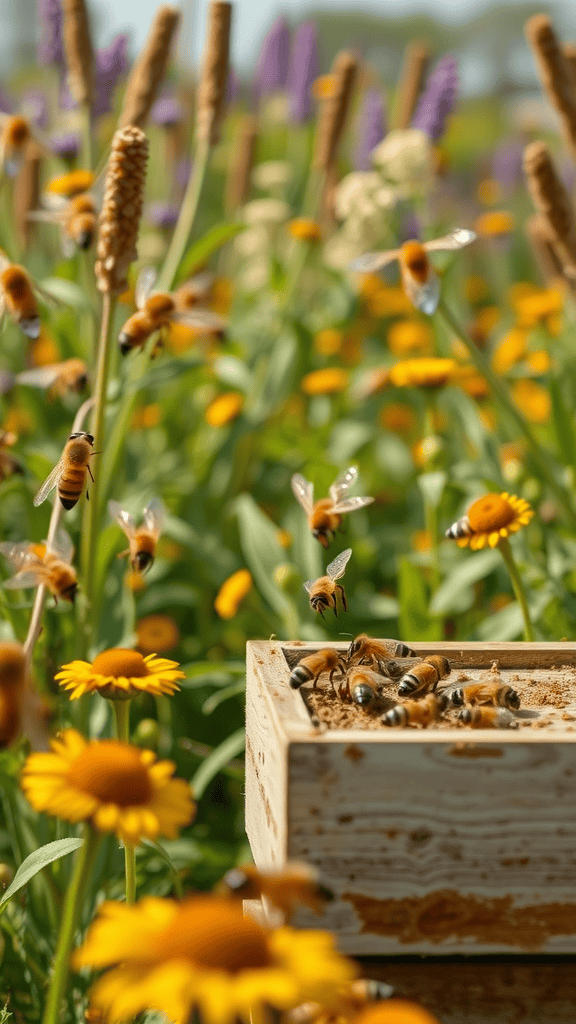The Terminology Behind Bee Farms: What Are They Called?
If you’ve ever wondered about bee farms, you might be curious about the terms commonly used to describe them. The primary term you’ll encounter is “apiary.” An apiary is a location where beehives are kept. In this space, bees are managed for various purposes, including honey production, pollination, and even for research and educational purposes. Let’s dive deeper into the terminology and what it all means.
People often use the word “beekeeper” when discussing those who manage bee farms. These individuals are passionate about their work, ensuring the health and productivity of their bees. A beekeeper may manage one or multiple apiaries, depending on their experience and resources.
Another term you might hear is “hive.” A hive refers to the structure that houses a colony of bees. Hives come in various styles, such as top-bar hives or Langstroth hives, each designed to meet the needs of both bees and the beekeeper. Understanding these distinctions is essential if you’re interested in starting your own bee farm.
Here’s a quick overview of key terms related to bee farms:
- Apiary: The location where beehives are kept.
- Beekeeper: The person who manages the bees and hives.
- Colony: A group of bees living together in a hive.
- Hive: The structure where bees live and work.
- Queen Bee: The dominant female in a bee colony responsible for reproduction.
- Drones: Male bees whose role is to mate with the queen.
- Worker Bees: Female bees that perform various tasks, from foraging to hive maintenance.
Each component plays a vital role in the ecosystem of the apiary. For example, the queen bee is essential for laying eggs and maintaining the colony’s population. Worker bees take on various roles; they gather nectar and pollen, care for larvae, and protect the hive.
When considering starting an apiary, it’s crucial to understand the needs of bees. Beekeeping requires knowledge about the species, their behaviors, and proper management techniques. Whether you’re drawn to beekeeping for honey production or interest in pollination’s vital role in agriculture, there’s always something new to learn.
Moreover, bee farms can contribute positively to the environment. By maintaining bee populations, you support ecosystem health. Bees are crucial for pollinating many of the fruits, vegetables, and nuts we consume daily. As their numbers decline, understanding and establishing apiaries can help reverse this trend.
If you want to keep bees, you’ll need to explore various local regulations regarding beekeeping. Each region may have different guidelines, so it’s beneficial to reach out to local beekeeping associations. Connecting with experienced beekeepers can also provide valuable insights into managing your first apiary successfully.
Education plays a key role in bee farming. Many future beekeepers attend workshops or classes, helping them build a solid foundation in managing their bees. Furthermore, many online resources, including videos and blogs, can guide you through the initial steps, from setting up an apiary to harvesting honey.
As you delve into the world of beekeeping, consider the community aspect. Local beekeeping clubs often foster a supportive environment, providing mentorship and camaraderie. Engaging with fellow beekeepers can enhance your knowledge and skills while offering networking opportunities for sharing resources and tips.
Understanding the terminology and roles within a bee farm is crucial for any aspiring beekeeper. From apiaries to hives and the diverse roles of bees, knowledge is vital. Enjoy the journey of discovering the amazing world of bees and the satisfaction of contributing positively to our environment.
The Importance of Apiaries in Modern Agriculture
Apiaries play a vital role in modern agriculture, serving as crucial hubs for beekeeping and pollination activities. A well-maintained apiary not only supports the life cycle of bees but also significantly enhances crop production and quality.
Bees are nature’s most efficient pollinators. In fact, more than 70 of the top 100 crop species are reliant on insect pollination, primarily from bees. This includes fruits, vegetables, and nuts. Without the work of bees in an apiary, we would see a dramatic decline in these essential foods, which could, in turn, disrupt food supply chains.
One of the primary benefits of maintaining an apiary is the increase in crop yields. When bees pollinate plants, they facilitate the transfer of pollen, allowing flowers to produce seeds and fruit. This process not only leads to more abundant harvests but also improves the quality and taste of the produce. Farmers who incorporate apiaries into their agricultural practices can expect:
- Improved fruit and seed set.
- Higher production quality.
- Increased biodiversity in crops.
The economic impact of apiaries in agriculture is significant. In the U.S. alone, the contribution of bees to the agricultural economy is estimated to be over $15 billion annually. This figure represents the added value that bee pollination brings to crops. Additionally, honey production from apiaries also contributes to farmers’ incomes, providing a dual benefit: both pollination and a product that can be sold.
Besides economic advantages, apiaries offer ecological benefits. They support the health of ecosystems by maintaining floral diversity. By pollinating various plant species, bees help sustain habitats that many other animals rely on for food and shelter. This interdependence signifies the importance of protecting bees and their environments. Implementing sustainable beekeeping practices in apiaries can also contribute to the overall health of the agriculture ecosystem. This can include methods such as:
- Minimizing pesticide use to protect bee populations.
- Planting diverse crops to enhance food sources for bees.
- Creating natural habitats around apiaries to foster local wildlife.
Furthermore, the presence of an apiary can lead to a cultivation of community awareness around environmental issues. Many local communities are taking initiatives to support bees due to their significance in agriculture. Community gardens often include beekeeping programs that not only benefit crop production but also educate the public about the critical role bees play in food systems.
Many farmers are beginning to understand that integrating apiaries is not just beneficial but essential for sustainable agriculture futures. With the global decline in bee populations due to various factors like climate change, habitat loss, and pesticides, the need for apiaries has never been more critical. When you advise a farmer or community leader about establishing an apiary, you’re not only recommending a method to improve yields but also advocating for a more sustainable agricultural practice.
The importance of apiaries in modern agriculture extends beyond honey production. They enhance crop yields, contribute to economic stability, support biodiversity, and foster community engagement. By promoting healthier ecosystems and facilitating effective pollination, apiaries stand as a cornerstone for successful and sustainable farming practices.
Understanding the multifaceted benefits of an apiary can inspire farmers and communities to take action in establishing their own beekeeping initiatives. Whether you are a farmer looking to boost your yield, or a community member interested in supporting local agriculture, recognizing the significance of apiaries can lead to more resilient food systems while preserving our vital bee populations.
Conclusion
Understanding the terminology surrounding bee farms is essential for anyone interested in beekeeping or the vital role bees play in agriculture. An apiary, as it’s officially known, serves as the heart of beekeeping efforts. These specialized locations are not just homes for bees; they are integral to our food systems and biodiversity.
Apiaries enable beekeepers to manage and care for their colonies efficiently. By doing so, they ensure that bees thrive and continue to pollinate crops and wild plants, which is essential for the food supply. As modern agriculture increasingly relies on these tiny workers, the role of apiaries becomes even more critical. They support local ecosystems and promote the health of numerous species through effective pollination.
Moreover, the significance of apiaries extends beyond agriculture. They contribute to the economy by producing honey, beeswax, and other bee-related products. As you explore the world of bee farming, you’ll discover how these operations can be both sustainable and profitable. With a greater public awareness of environmental issues, more people are recognizing the importance of protecting these buzzing allies.
Whether you’re considering starting your own apiary or simply want to appreciate the work that goes into maintaining bee populations, remember that this endeavor holds essential benefits for our planet. By understanding what these farms are called and their importance, you can contribute to the growing movement of sustainability and ecological awareness. Embrace the buzz around beekeeping and spread the word about the vital role apiaries play in our world.
As an Amazon Associate, I earn from qualifying purchases.

